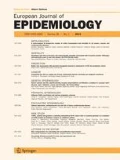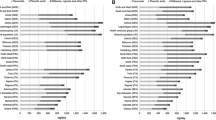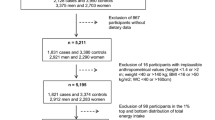Abstract
Polyphenols may play a chemopreventive role in colorectal cancer (CRC); however, epidemiological evidence supporting a role for intake of individual polyphenol classes, other than flavonoids is insufficient. We evaluated the association between dietary intakes of total and individual classes and subclasses of polyphenols and CRC risk and its main subsites, colon and rectum, within the European Prospective Investigation into Cancer and Nutrition (EPIC) study. The cohort included 476,160 men and women from 10 European countries. During a mean follow-up of 14 years, there were 5991 incident CRC cases, of which 3897 were in the colon and 2094 were in the rectum. Polyphenol intake was estimated using validated centre/country specific dietary questionnaires and the Phenol-Explorer database. In multivariable-adjusted Cox regression models, a doubling in total dietary polyphenol intake was not associated with CRC risk in women (HRlog2 = 1.06, 95% CI 0.99–1.14) or in men (HRlog2 = 0.97, 95% CI 0.90–1.05), respectively. Phenolic acid intake, highly correlated with coffee consumption, was inversely associated with colon cancer in men (HRlog2 = 0.91, 95% CI 0.85–0.97) and positively associated with rectal cancer in women (HRlog2 = 1.10, 95% CI 1.02–1.19); although associations did not exceed the Bonferroni threshold for significance. Intake of other polyphenol classes was not related to colorectal, colon or rectal cancer risks. Our study suggests a possible inverse association between phenolic acid intake and colon cancer risk in men and positive with rectal cancer risk in women.

Similar content being viewed by others
Abbreviations
- BMI:
-
Body mass index
- CRC:
-
Colorectal cancer
- CI:
-
Confidence interval
- EPIC:
-
European Prospective Investigation into Cancer and Nutrition
- HR:
-
Hazard ratio
- ICD:
-
International classification of diseases
- NOS:
-
Not otherwise specified
- SD:
-
Standard deviation
References
Ferlay J, Soerjomataram I, Dikshit R, et al. Cancer incidence and mortality worldwide: sources, methods and major patterns in GLOBOCAN 2012. Int J Cancer. 2015;136(5):E359–86. https://doi.org/10.1002/ijc.29210.
World Cancer Research Fund and American Institute for Cancer Research. Continuous update project report: diet, nutrition, physical activity and colorectal cancer. 2017. http://www.wcrf.org/int/research-we-fund/continuous-update-project-findings-reports/colorectal-bowel-cancer. Accessed 06 Dec 2017.
Zamora-Ros R, Touillaud M, Rothwell JA, Romieu I, Scalbert A. Measuring exposure to the polyphenol metabolome in observational epidemiologic studies: current tools and applications and their limits. Am J Clin Nutr. 2014;100(1):11–26. https://doi.org/10.3945/ajcn.113.077743.
de Kok TM, van Breda SG, Manson MM. Mechanisms of combined action of different chemopreventive dietary compounds: a review. Eur J Nutr. 2008;47(Suppl 2):51–9. https://doi.org/10.1007/s00394-008-2006-y.
Kampa M, Nifli AP, Notas G, Castanas E. Polyphenols and cancer cell growth. Rev Physiol Biochem Pharmacol. 2007;159:79–113. https://doi.org/10.1007/112_2006_0702.
Thomasset SC, Berry DP, Garcea G, et al. Dietary polyphenolic phytochemicals-promising cancer chemopreventive agents in humans? Int J Cancer. 2007;120(3):451–8. https://doi.org/10.1002/ijc.22419.
Marchesi JR, Adams DH, Fava F, et al. The gut microbiota and host health: a new clinical frontier. Gut. 2016;65(2):330–9. https://doi.org/10.1136/gutjnl-2015-309990.
Manach C, Williamson G, Morand C, Scalbert A, Remesy C. Bioavailability and bioefficacy of polyphenols in humans. I. Review of 97 bioavailability studies. Am J Clin Nutr. 2005;81(1 Suppl):230S–42S.
Selma MV, Espin JC, Tomas-Barberan FA. Interaction between phenolics and gut microbiota: role in human health. J Agric Food Chem. 2009;57(15):6485–501. https://doi.org/10.1021/jf902107d.
Nunez-Sanchez MA, Gonzalez-Sarrias A, Romo-Vaquero M, et al. Dietary phenolics against colorectal cancer—from promising preclinical results to poor translation into clinical trials: pitfalls and future needs. Mol Nutr Food Res. 2015;59(7):1274–91. https://doi.org/10.1002/mnfr.201400866.
Jiang R, Botma A, Rudolph A, Husing A, Chang-Claude J. Phyto-oestrogens and colorectal cancer risk: a systematic review and dose-response meta-analysis of observational studies. Br J Nutr. 2016;116(15):2115–28. https://doi.org/10.1017/S0007114516004360.
Nimptsch K, Zhang X, Cassidy A, et al. Habitual intake of flavonoid subclasses and risk of colorectal cancer in 2 large prospective cohorts. Am J Clin Nutr. 2016;103(1):184–91. https://doi.org/10.3945/ajcn.115.117507.
Zamora-Ros R, Barupal DK, Rothwell JA, et al. Dietary flavonoid intake and colorectal cancer risk in the European prospective investigation into cancer and nutrition (EPIC) cohort. Int J Cancer. 2017;140(8):1836–44. https://doi.org/10.1002/ijc.30582.
Arts IC, Jacobs DR Jr, Gross M, Harnack LJ, Folsom AR. Dietary catechins and cancer incidence among postmenopausal women: the Iowa Women’s Health Study (United States). Cancer Causes Control. 2002;13(4):373–82.
Wang ZJ, Ohnaka K, Morita M, et al. Dietary polyphenols and colorectal cancer risk: the Fukuoka colorectal cancer study. World J Gastroenterol. 2013;19(17):2683–90. https://doi.org/10.3748/wjg.v19.i17.2683.
Neveu V, Perez-Jimenez J, Vos F, et al. Phenol-Explorer: an online comprehensive database on polyphenol contents in foods. Database (Oxford). 2010;2010:bap024. https://doi.org/10.1093/database/bap024.
Zamora-Ros R, Knaze V, Rothwell JA, et al. Dietary polyphenol intake in Europe: the European Prospective Investigation into Cancer and Nutrition (EPIC) study. Eur J Nutr. 2015;55:1359–75. https://doi.org/10.1007/s00394-015-0950-x.
Riboli E, Hunt KJ, Slimani N, et al. European Prospective Investigation into Cancer and Nutrition (EPIC): study populations and data collection. Public Health Nutr. 2002;5(6B):1113–24. https://doi.org/10.1079/PHN2002394.
Margetts BM, Pietinen P. European Prospective Investigation into Cancer and Nutrition: validity studies on dietary assessment methods. Int J Epidemiol. 1997;26(Suppl 1):S1–5.
Slimani N, Deharveng G, Unwin I, et al. The EPIC nutrient database project (ENDB): a first attempt to standardize nutrient databases across the 10 European countries participating in the EPIC study. Eur J Clin Nutr. 2007;61(9):1037–56. https://doi.org/10.1038/sj.ejcn.1602679.
Wareham NJ, Jakes RW, Rennie KL, et al. Validity and repeatability of a simple index derived from the short physical activity questionnaire used in the European Prospective Investigation into Cancer and Nutrition (EPIC) study. Public Health Nutr. 2003;6(4):407–13. https://doi.org/10.1079/PHN2002439.
Rothwell JA, Perez-Jimenez J, Neveu V, et al. The Phenol-Explorer 3.0: a major update of the Phenol-Explorer database to incorporate data on the effects of food processing on polyphenol content. Database (Oxford). 2013;2013:bat070. https://doi.org/10.1093/database/bat070.
Knaze V, Rothwell JA, Zamora-Ros R, et al. A new food composition database for 437 polyphenols in 19,899 raw and prepared foods used to estimate polyphenol intakes in adults from 10 European countries. Am J Clin Nutr. 2018. [Submitted].
Brown CC, Kipnis V, Freedman LS, et al. Energy adjustment methods for nutritional epidemiology: the effect of categorization. Am J Epidemiol. 1994;139(3):323–38.
Edmands WM, Ferrari P, Rothwell JA, et al. Polyphenol metabolome in human urine and its association with intake of polyphenol-rich foods across European countries. Am J Clin Nutr. 2015;102(4):905–13. https://doi.org/10.3945/ajcn.114.101881.
Murphy N, Achaintre D, Zamora-Ros R, et al. A prospective evaluation of plasma polyphenol levels and colon cancer risk. Int J Cancer. 2018. https://doi.org/10.1002/ijc.31563. [Epub ahead of print].
Dik VK, Bueno-de-Mesquita HB, Van Oijen MG, et al. Coffee and tea consumption, genotype-based CYP1A2 and NAT2 activity and colorectal cancer risk-results from the EPIC cohort study. Int J Cancer. 2014;135(2):401–12. https://doi.org/10.1002/ijc.28655.
Gunter MJ, Murphy N, Cross AJ, et al. Coffee drinking and mortality in 10 European countries: a multinational cohort study. Ann Intern Med. 2017;167(4):236–47. https://doi.org/10.7326/M16-2945.
Vieira AR, Abar L, Chan D, et al. Foods and beverages and colorectal cancer risk: a systematic review and meta-analysis of cohort studies, an update of the evidence of the WCRF-AICR continuous update project. Ann Oncol. 2017;28(8):1788–802. https://doi.org/10.1093/annonc/mdx171.
Gan Y, Wu J, Zhang S, et al. Association of coffee consumption with risk of colorectal cancer: a meta-analysis of prospective cohort studies. Oncotarget. 2017;8(12):18699–711. https://doi.org/10.18632/oncotarget.8627.
Green CJ, de Dauwe P, Boyle T, Tabatabaei SM, Fritschi L, Heyworth JS. Tea, coffee, and milk consumption and colorectal cancer risk. J Epidemiol. 2014;24(2):146–53.
Kashino I, Akter S, Mizoue T, et al. Coffee drinking and colorectal cancer and its subsites: a pooled analysis of 8 cohort studies in Japan. Int J Cancer. 2018. https://doi.org/10.1002/ijc.31320.
Zamora-Ros R, Rothwell JA, Scalbert A, et al. Dietary intakes and food sources of phenolic acids in the European Prospective Investigation into Cancer and Nutrition (EPIC) study. Br J Nutr. 2013;110(8):1500–11. https://doi.org/10.1017/S0007114513000688.
Schmit SL, Rennert HS, Rennert G, Gruber SB. Coffee consumption and the risk of colorectal cancer. Cancer Epidemiol Biomarkers Prev. 2016;25(4):634–9. https://doi.org/10.1158/1055-9965.EPI-15-0924.
Zamora-Ros R, Achaintre D, Rothwell JA, et al. Urinary excretions of 34 dietary polyphenols and their associations with lifestyle factors in the EPIC cohort study. Sci Rep. 2016;6:26905. https://doi.org/10.1038/srep26905.
Guertin KA, Loftfield E, Boca SM, et al. Serum biomarkers of habitual coffee consumption may provide insight into the mechanism underlying the association between coffee consumption and colorectal cancer. Am J Clin Nutr. 2015;101(5):1000–11. https://doi.org/10.3945/ajcn.114.096099.
Dominianni C, Huang WY, Berndt S, Hayes RB, Ahn J. Prospective study of the relationship between coffee and tea with colorectal cancer risk: the PLCO Cancer Screening Trial. Br J Cancer. 2013;109(5):1352–9. https://doi.org/10.1038/bjc.2013.434.
Org E, Mehrabian M, Parks BW, et al. Sex differences and hormonal effects on gut microbiota composition in mice. Gut Microbes. 2016;7(4):313–22. https://doi.org/10.1080/19490976.2016.1203502.
Bolnick DI, Snowberg LK, Hirsch PE, et al. Individual diet has sex-dependent effects on vertebrate gut microbiota. Nat Commun. 2014;5:4500. https://doi.org/10.1038/ncomms5500.
Bo Y, Sun J, Wang M, Ding J, Lu Q, Yuan L. Dietary flavonoid intake and the risk of digestive tract cancers: a systematic review and meta-analysis. Sci Rep. 2016;6:24836. https://doi.org/10.1038/srep24836.
He X, Sun LM. Dietary intake of flavonoid subclasses and risk of colorectal cancer: evidence from population studies. Oncotarget. 2016;7(18):26617–27. https://doi.org/10.18632/oncotarget.8562.
Woo HD, Kim J. Dietary flavonoid intake and risk of stomach and colorectal cancer. World J Gastroenterol. 2013;19(7):1011–9. https://doi.org/10.3748/wjg.v19.i7.1011.
Yuan JM, Gao YT, Yang CS, Yu MC. Urinary biomarkers of tea polyphenols and risk of colorectal cancer in the Shanghai Cohort Study. Int J Cancer. 2007;120(6):1344–50. https://doi.org/10.1002/ijc.22460.
Ward HA, Kuhnle GG, Mulligan AA, et al. Breast, colorectal, and prostate cancer risk in the European Prospective Investigation into Cancer and Nutrition-Norfolk in relation to phytoestrogen intake derived from an improved database. Am J Clin Nutr. 2010;91(2):440–8. https://doi.org/10.3945/ajcn.2009.28282.
Kuijsten A, Hollman PC, Boshuizen HC, et al. Plasma enterolignan concentrations and colorectal cancer risk in a nested case-control study. Am J Epidemiol. 2008;167(6):734–42. https://doi.org/10.1093/aje/kwm349.
Kyro C, Olsen A, Landberg R, et al. Plasma alkylresorcinols, biomarkers of whole-grain wheat and rye intake, and incidence of colorectal cancer. J Natl Cancer Inst. 2014;106(1):djt352. https://doi.org/10.1093/jnci/djt352.
Stracci F, Zorzi M, Grazzini G. Colorectal cancer screening: tests, strategies, and perspectives. Front Public Health. 2014;2:210. https://doi.org/10.3389/fpubh.2014.00210.
Neugut AI, Jacobson JS, De Vivo I. Epidemiology of colorectal adenomatous polyps. Cancer Epidemiol Biomarkers Prev. 1993;2(2):159–76.
Acknowledgements
We thank Mr Bertrand Hémon for his valuable help with the EPIC database. We also acknowledge the Northern Sweden Diet Database.
Funding
This study was supported by the Institut National du Cancer, Paris (INCa Grants 2011-105). The coordination of EPIC is financially supported by the European Commission (DG-SANCO) and the International Agency for Research on Cancer. The national cohorts are supported by Danish Cancer Society (Denmark); Ligue Contre le Cancer, Institut Gustave Roussy, Mutuelle Générale de l’Education Nationale, Institut National de la Santé et de la Recherche Médicale (INSERM) (France); German Cancer Aid, German Cancer Research Center (DKFZ), Federal Ministry of Education and Research (BMBF), Deutsche Krebshilfe, Deutsches Krebsforschungszentrum and Federal Ministry of Education and Research (Germany); the Hellenic Health Foundation (Greece); Associazione Italiana per la Ricerca sul Cancro-AIRC-Italy and National Research Council (Italy); Dutch Ministry of Public Health, Welfare and Sports (VWS), Netherlands Cancer Registry (NKR), LK Research Funds, Dutch Prevention Funds, Dutch ZON (Zorg Onderzoek Nederland), World Cancer Research Fund (WCRF), Statistics Netherlands (The Netherlands); European Research Council (ERC-2009-AdG 232997); Health Research Fund (FIS): PI13/00061 to Granada; PI13/01162 to EPIC-Murcia, Regional Governments of Andalucía, Asturias, Basque Country, Murcia and Navarra, AGAUR - Generalitat de Catalunya (exp. 2014 SGR 726), The Health Research Funds RD12/0036/0018, cofunded by European Regional Development Fund (ERDF) “A way to build Europe (Spain); the Swedish Research Council for Health, Working Life and Welfare (FORTE), Swedish Cancer Society, Swedish Research Council (VR) and County Councils of Skåne and Västerbotten (Sweden); Cancer Research UK (14136 to EPIC-Norfolk; C570/A16491 and C8221/A19170 to EPIC-Oxford), Medical Research Council (1000143 to EPIC-Norfolk, MR/M012190/1 to EPIC-Oxford) (United Kingdom). RZ-R was supported by the “Miguel Servet” program (CP15/00100) from the Institute of Health Carlos III and European Social Fund (ESF).
Author information
Authors and Affiliations
Corresponding author
Ethics declarations
Conflict of interest
The authors declare that they have no conflict of interest.
Electronic supplementary material
Below is the link to the electronic supplementary material.
Rights and permissions
About this article
Cite this article
Zamora-Ros, R., Cayssials, V., Jenab, M. et al. Dietary intake of total polyphenol and polyphenol classes and the risk of colorectal cancer in the European Prospective Investigation into Cancer and Nutrition (EPIC) cohort. Eur J Epidemiol 33, 1063–1075 (2018). https://doi.org/10.1007/s10654-018-0408-6
Received:
Accepted:
Published:
Issue Date:
DOI: https://doi.org/10.1007/s10654-018-0408-6




